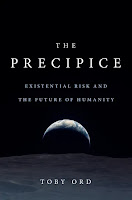The Precipice: Existential Risk and the Future of Humanity
A new book has come out progress on the largest imaginable time scale. It's called The Precipice and it was written by Oxford-based Australian moral philosopher Toby Ord. The book states that we, as humanity, may only be at the beginning of our development. Humanity has existed for 200,000 years and there could be millions of future human generations. In the time we have had as humanity so far, we have made significant progress in improving the human condition, particularly in the last few hundred years. As humanity, we have collaborated with each other over time and distance.
Three revolutions
Three major revolutions have brought about enormous breakthroughs: the agricultural revolution (approx. 10,000 years ago), the scientific revolution (started approx. 1600) and the industrial revolution (started approx. 1750).
The agricultural revolution allowed people to settle permanently in areas allowing for the formation of cities and states. The scientific revolution allowed people to systematically build knowledge about the world and free themselves from dogma. The modern concept of progress dates from this period. The industrial revolution made it possible for machines to take over large parts of human labor. This caused an unprecedented explosion of productivity and prosperity.
The history and future of progress
As a result of these developments, humanity has made a great deal of progress. We have made huge progress materially. Just a few hundred years ago, hunger and poverty were the norm for the vast majority of humanity, now for a tiny minority. In addition, much progress has been made in education, health and morality. Every human alive today is the beneficiary of innumerable innovations that humanity has produced over thousands of years. This trend of progress can continue. In Ord's view, humanity has great potential. We could solve many remaining problems and reach levels of flourishing that we can barely imagine today.
The ability to destroy ourselves
But this potential for progress is threatened by the fact that, for the first time, we have the ability to destroy ourselves. The invention of nuclear weapons started this period. More dangers that could lead to the destruction of humanity are now known, from climate change to human-caused pandemics and unaligned artificial intelligence. Ord states that we as humanity are faced with the task of growing up and dealing responsibly with this threat.
Knowledge and technology have given us tremendous power. Now we must learn to use that power wisely.
The existential risks
The book describes the science behind the risks we face. He describes that the added chance of destruction by natural risks (from asteroids, volcanic eruptions, cosmic phenomena) is extremely low. However, the added chance of destruction by human-caused factors (AI, climate change, other environmental damage, war, pandemics, etc.) is high, although the chance of destruction in the short term varies greatly per factor.
Ord advocates that we as humanity spend much more money, time and attention on averting these risks and that we coordinate this process internationally.
What Anyone Can Do
Much of the work required will be carried out by policy makers and specialists. But as ordinary people, we can also contribute. We can consciously think about the career we choose, how we vote in elections, how we invest our money, how we spend our money and how we talk to each other about these kinds of topics. Countless people are already playing a good role by helping in their individual choices. Examples of small steps that many are already taking are stopping eating meat, switching from fossil fuel to alternative to sustainable energy, choosing a savings account with a bank that invests ethically, etc.
A wonderful development ahead
The book is optimistic. It compares humanity to an adolescent who has been given great opportunities (including killing himself) and who must learn to deal with them responsibly. If this happens, that adolescent may have a wonderful development ahead.

Comments